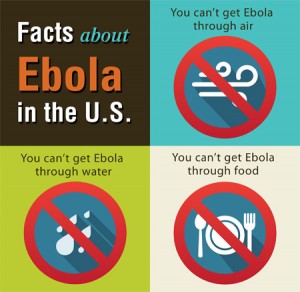 Ebola concern has been heightened in Northeast Ohio since learning yesterday that the second healthcare worker to be diagnosed with Ebola flew commercially from Dallas/Fort Worth to Cleveland aboard Frontier Airlines flight 1142 on October 10, and from Cleveland to Dallas/Fort Worth aboard Frontier Airlines flight 1143 on October 13. Passengers aboard either flight are urged to contact the CDC at 1-800-CDC-INFO.
Ebola concern has been heightened in Northeast Ohio since learning yesterday that the second healthcare worker to be diagnosed with Ebola flew commercially from Dallas/Fort Worth to Cleveland aboard Frontier Airlines flight 1142 on October 10, and from Cleveland to Dallas/Fort Worth aboard Frontier Airlines flight 1143 on October 13. Passengers aboard either flight are urged to contact the CDC at 1-800-CDC-INFO.
The Dallas nurse traveled to Summit County, Ohio to visit family after caring for Thomas Eric Duncan at a Texas Hospital while he was contagious. Duncan was the first Ebola case diagnosed in the U.S. He contracted the disease in West Africa where an ongoing outbreak has infected 8,973 and killed 4,484 since December 2013.
Ohio activated its Ebola preparedness plan upon learning that an Ebola patient had visited the state. Ohio is taking an aggressive response to the situation. The Ohio Department of Health has been working with the CDC and Summit County Health Department to trace the Dallas nurse’s contacts while in Ohio, to notify her contacts of their risk and to monitor contacts to prevent the further spread of Ebola. Summit County is using its quarantine powers to isolate people that had confirmed close contact with the nurse—one person so far.
The Morrow County Health Department has not been notified that any Morrow County resident had contact with this patient.
“Most importantly, we want to reassure Morrow County residents that there is no Ebola threat in our community at this time,” said Angela Smith, Morrow County Health Commissioner. “Ebola does not spread like a cold or the flu; to get Ebola, you must have contact with the bodily fluids of someone who is infected with Ebola and is symptomatic.”
State and local health officials, emergency management and hospitals have been working to plan for Ebola cases since this summer. The Morrow County Health Department, Hospital, EMA, EMS, Sheriff Office, county officials, long term care facilities, social service agencies, mental health agencies, schools, businesses and members of the faith community are coordinating local efforts to proactively prepare for possible cases.
This group of response partners has been meeting since January 2013 to prepare their organizations and staffs for serious public health threats, natural disasters, or widespread emergencies. The purpose of the group is to bring partners together to exchange information and planning assumptions so that each organization’s efforts will be synchronized with the community’s overall effort.
Since early August, the Health Department has been sharing updates and CDC guidance with response partners through its Health Alert Network. Over the past month, as cases have been treated and diagnosed in the U.S., healthcare and emergency response partners in Morrow County are focusing attention on their efforts to prepare locally for possible Ebola cases. Organizations who wish to join the Morrow County Healthcare Coalition can contact Patti Ray at 419-947-1545.
Smith said that the Morrow County Health Department has received no information that anyone living or working in the community is at risk. She explained that the risk of an Ebola outbreak like that seen in West Africa is very low because the U.S. has much better medical practices and treatments, better public health monitoring and controls, better infrastructure, better sanitation, less overcrowding, and because the public is better positioned to get informed and protect themselves and their families.
Ebola is a rare and deadly diseases caused by a virus that can infect humans and other primates (monkeys, gorillas and chimpanzees). The time interval between infection and the start of symptoms ranges from 2 to 21 days, but the average is 8 to 10 days. The first Ebola symptoms are fever, fatigue, muscle pain, headache and sore throat. This is followed by vomiting, stomach pain, diarrhea, rash, symptoms of impaired kidney and liver function, unexplained bruising or bleeding, and in some cases both internal and external bleeding. The first outbreak of Ebola occurred in 1976 in what is now the Democratic Republic of the Congo, and outbreaks have since appeared sporadically in rural areas of Africa.
Smith reminded travelers that CDC has issued warnings against non-essential travel to Liberia, Guinea and Sierra Leone, and has issued an alert to practice enhanced precautions to anyone traveling to the Democratic Republic of Congo. If you must travel to West Africa, you are urged to check your health insurance plan to be sure that medical evacuation services are covered, and to carefully follow all guidance provided to travelers at the CDC website. Anyone who has traveled or will be traveling to West Africa, is urged to contact their physician and local health department so they may assist with planning and follow-up to protect the traveler, his or her loved ones, and the community.
For more information:
- On Ebola signs and symptoms, how the disease spreads, a person’s risk of getting Ebola, how to prevent Ebola, or about the outbreak, visit www.cdc.gov/vhf/ebola/index.html.
- On Ohio’s response, visit www.odh.ohio.gov/news/news.aspx.
- For travelers, visit wwwnc.cdc.gov/travel/diseases/ebola.
For questions or more information about the local efforts regarding Ebola, contact Morrow County Health
Department at (419) 947-1545 or visit MorrowCountyHealth.org.